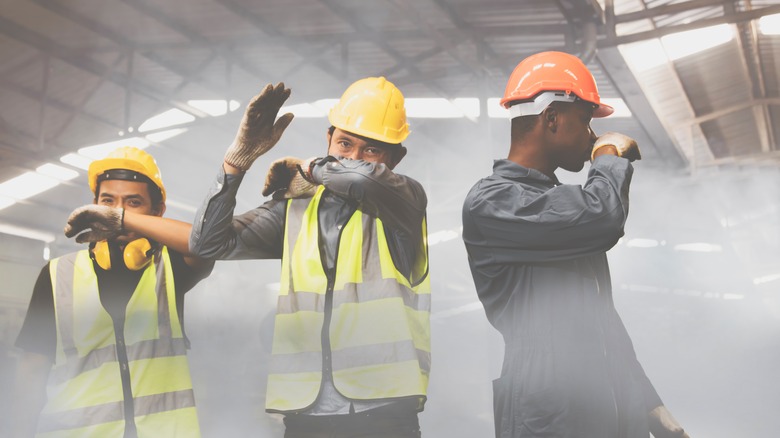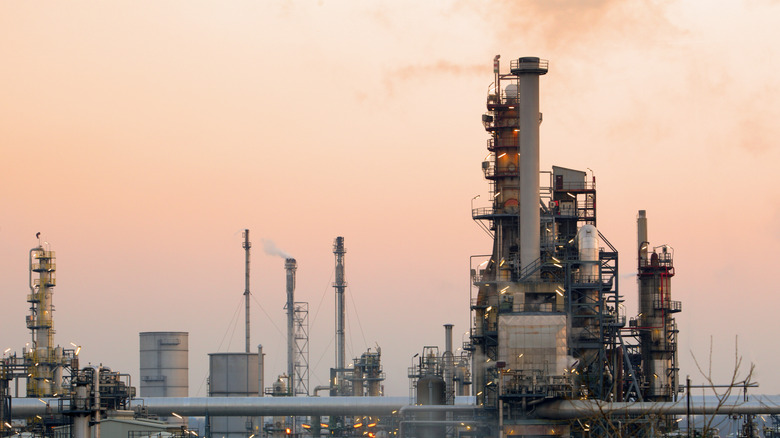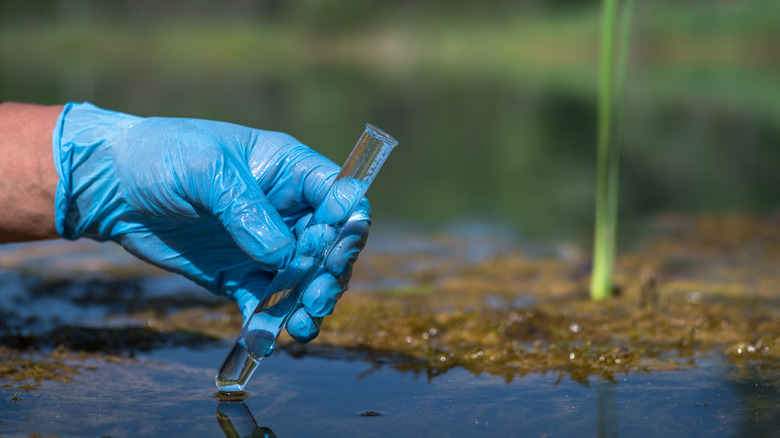What Is Vinyl Chloride And Why Is It So Toxic?
When a 100-plus car Norfolk Southern train carrying a broad range of products on February 3, 2023 derailed in northeastern Ohio near the Pennsylvania state line, it caused a serious panic — and for good reason. Per ABC News, not only were there 50 cars derailed and in flames but 20 of the cars were classified as carrying hazardous materials. There was a scramble among Norfolk Southern and emergency crews to find out if the most dangerous materials were at risk of combustion and dispersal into the air. The matter was so serious that officials from 68 government agencies from multiple states responded to the event, the AP reported. In particular, officials were worried about vinyl chloride that had been among the derailed cars and some of which had been exposed to fire.
Before long, the city urged an evacuation of all residents in the immediate area of East Palestine, Ohio. "We need to get everybody who remained within that mile radius — or decided they needed to come back within that mile radius — we need you to leave now," Fire Chief Keith Drabick said (via CNN). Although cases of vinyl chloride accidents are rare, the emergency response is certainly warranted. According to Popular Mechanics, a freight train that derailed in Paulsboro, New Jersey, dumped a tanker of vinyl chloride, sending dozens of residents to the hospital. In 2018, a vinyl chloride leak at a Chinese plant producing PVC resulted in the immediate death of 23 workers, per Chemical & Engineering News.
What is vinyl chloride?
According to the Department of Health and Human Services, at room temperature, vinyl chloride is a colorless gas. And at lower temperatures, it's stored as a liquid. It's most often used to make polyvinyl chloride, which is more commonly known as PVC. And that PVC is a hard plastic resin used to make a whole wide range of consumer products like shower curtains, packaging materials, carpeting, pipes, cling wrap, and wire and cable coatings, per Popular Mechanics. Vinyl chloride, which is also called vinyl chloride monomer (VCM) or chloroethene, does not occur naturally and must be produced industrially for commercial uses. The United States and China are the two largest producers of vinyl chloride, according to the AP.
Because vinyl chloride is highly flammable, it can be a serious danger. It's highly flammable, toxic, and carcinogenic. Per the Environmental Protection Agency, exposure to the gas can cause drowsiness, dizziness, and headache when inhaled. Prolonged exposure can lead to liver damage. At extremely high levels, vinyl chloride can cause respiratory problems, loss of consciousness, and lung and kidney irritation. It can even cause death. According to the National Cancer Institute, vinyl chloride exposure is associated with an increased risk of a number of cancers. The list includes hepatic angiosarcoma, a rare form of liver cancer; hepatocellular carcinoma, primary liver cancer; lymphoma; leukemia; and brain and lung cancers. However, the agency notes that PVC is not a known or suspected carcinogen.
How are people exposed to vinyl chloride?
Although exposures to dangerous amounts of vinyl chloride are rare, they do occur. Workers at facilities where vinyl chloride is produced or used run the highest risk, given the high quantities on hand. That exposure most likely comes in the form of inhalation. The general public may be exposed by inhaling contaminated air. The highest levels of vinyl chloride in the environment are found in the air around factories that produce vinyl products, according to the National Institute of Health. If a water supply is contaminated, vinyl chloride can enter household air when the water is used for showering, cooking, or laundry. According to the Department of Health and Human Services, several tests have the ability to detect vinyl chloride exposure, depending on the recency and level of exposure.
So, what should you do if you think you're at risk of potential vinyl chloride exposure? People with pre-existing lung or breathing problems are at particular risk. "If you have, you know, asthma, emphysema, COPD, stay in and keep your evacuation distances away," Silverio Caggiano, a battalion chief with the Youngstown, Ohio Fire Department specializing in hazardous materials, told WKBN. And if the vinyl chloride does catch fire, it's important to evacuate the area. Caggiano added: "They could kill you because of the damage they could do to your respiratory system. Because most of the damage with this is going to be inhalatory. So this is some bad stuff."


